…in a letter to a Unitarian Universalist Minister
Keith Hamilton Cobb
…The topic you articulated in your letter was, I believe, a question of purpose. Can a thing, project, endeavor grow without a predetermined end, and if there is not an end, what is the metric for the value of it having grown; grown to where? We began down this road talking about The Untitled Othello Project, and how it is not about knowing what we want to achieve other than an honest and in-depth, human-centric interrogation of the play replete with why?, why should we?, why shouldn’t we, what are the primary drivers, and does everyone involved feel supported and equally seen/heard??? As theater-makers, of course there must be a fantasy somewhere about making theater out of a thing. That is to say, it would be a shame if all of the arduous exploration didn’t bring us to something particularly worthy of sharing with the world as a stage piece. And as a result of the harbouring of that fantasy, the work as it is happening is never completely without judgment. As theater-makers, I don’t think there is any removing of the scrutiny regarding significance altogether. What else, ultimately, would compel us to do a thing? This scrutiny that Feldman (Christina Feldman, Buddhist educator and philosopher) describes as “ideas of ‘better than,’ ‘worse than,’ or ‘same as,’” might liberate us from all views of “self” and “other” as relates to comparisons of/between people. Though I doubt, however, that I would in fact want to be free of my ability to discern, say, a good actor from a bad one, or an engaging Thanksgiving dinner guest from an inane and boring one (you being the former). And were I to apply her suggestion to the making of theater, which is, again, where we began, I would need to contend that, while there cannot be a predetermined outcome, the ability to gauge better than, worse than, and most particularly same as is an indispensable tool. We are recycling Shakespeare in our American theater perpetually for unsavory reasons too multitude and complex to go into here. Much of it has to do with an ongoing effort to hold it up and hang on to it as indicative of white excellence, even as the white theater-making structure continues to make nothing but mediocrity out of it. Suffice it to say the sameness of it all irrespective of the “stylized stink” that some too clever by half director would like to believe they are putting on it, handed to a audience of the opiated and uneducated is everything that is wrong. We are indeed after something infinitely better than that, even if we do not begin by knowing what better looks like. We do know quite assuredly what it does NOT look like.
Yes, the paradox of creative work is the issue of judgment… Well…that’s one of the paradoxes at least. Another, if we may call it that and not just plain old “fucked up,” is that even the judgment-free creative who might be out there creating something absolutely sublime as a result of their ability to not judge, if we are to see it, use it, be nourished by it, will ultimately have to submit their work to the scrutiny of a public wholly influence by the oppressive, over-arching pall of an industrial complex in the business of determining good or bad on the publics behalf and then selling it to them. Capitalism tends to make purgatory out of everything…
Things, projects, endeavors that break from the paradox, by being more present; in the same way that we are more present with each other at the Thanksgiving dinner table than many a younger generation human has been with anyone yet their entire lives are, by THEIR very nature, significant, and it is in no way unvirtuous to discern so, or even to champion such. Some critical mass of someones must at some point ask your question: What then are we to do with our lives? and realize that what begins with baby steps of mindfulness at the dinner table can save us from the nothingness of what the digitally driven money making machine of the 21st century has done to our ability to know what sucks.
In the rooms of The Untitled Othello Project that we convene, we grope too, endlessly, and would love nothing more than to be perpetually supported in doing so. But it is a room; The City of Love in microcosm. Without that city expand beyond us and embrace us, we will forever need to rely on our tools to discern good from bad, and right from wrong. We would be something like idiots without them.
Blessings, Reverend.


